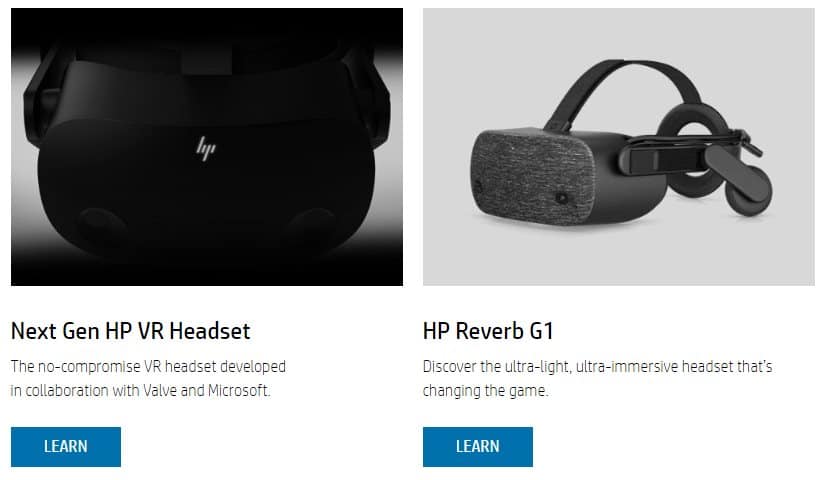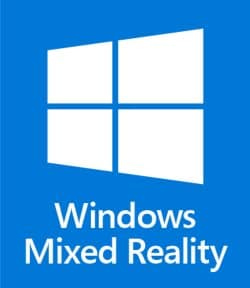On the 23rd of March 2020, in addition to the public release of one the biggest VR game titles Half-Life: Alyx, HP also decided to throw in a news bomb of their own. In collaboration with Valve and Microsoft, the second-generation HP Reverb G2 is to be released soon. See the teaser video below:
Before diving into analysis and speculations, let`s look at other pieces of the little information we currently have available about the new headset.
1) On HP`s homepage VR section, we can now see both the old and the new Reverb headsets listed.

2) On the actual official product page of the new Reverb headset, there is the following description:
“Developed in collaboration with Valve and Microsoft, the next gen HP VR headset delivers a more immersive, comfortable and compatible experience than the previous generation. It’s the new standard in VR.”
3) Finally, we have the “official” Twitter post by HP Z where the teaser was released. In addition to the short video clip, the following information went along with it:
“Developers, architects, and #VR users – this one’s for you.
Get a sneak peek of the next benchmark in virtual reality headsets from @HP x @ValveSoftware x @Microsoft. http://hp.com/reverb“.
HP Reverb G2 Release Date Not Yet Specified
HP has yet to release any information about the specifications of the headset, nor the time it will be released. However, by launching the teaser video in March 2020, it seems likely that we will not have to wait for too long.

My guess is that the HP Reverb G2 will be available for purchase in the summer of 2020, or autumn at the latest.
Collaboration between HP, Valve & Microsoft
So, we know that in addition to HP, Valve & Microsoft have also contributed to making the new Reverb headset. What we don`t know, however, is their actual role in the development process. But we can make some deductions and guesses.
Valve`s Role in the Project
The thing I noticed from the teaser clip is that instead of listing “Valve Corporation” as the contributor, they chose to use “SteamVR”

I think this is intentional to emphasize the software side over hardware. But in that case – what does it mean? The previous HP Reverb + Windows Mixed Reality platform already has SteamVR support. Could “SteamVR” + “compatibility” mentioned in the Twitter post mean native Steam support and not having to use it through WMR? It seems unlikely, because Microsoft, of course, has its vested interests here too.
If not native Steam support, then could it be SteamVR lighthouse tracking that is the key contribution from Valve? The Reverb had notoriously problematic tracking in its first release, and it seems reasonable that HP would like to address this problem. And SteamVR tracking would be a really viable high-quality option for that. However, I personally doubt this scenario as well for reasons I am going to explain further in the article.
But maybe then it is not software after all? I mean, the audio solution that is visible from the teaser clip seems awfully similar to the ear speakers that the Valve Index uses. Could it be then that HP has “borrowed” the audio solution and maybe some other hardware components from Valve?
On the other hand, the audio system of the original Reverb has similar outlines as well, so it is hard to tell. I guess we will just have to wait and see.
Where does Microsoft fit in?
So where does this leave Microsoft and its role in the collaboration? Firstly Microsoft most probably would like to push some life into their Windows Mixed Reality platform.

Lately, there really haven`t been any standout WMR products that would help to lift and popularise the platform. Could it be that the Reverb G2 is exactly what Microsoft needs to achieve this? Maybe with also a revamped WMR 2.0 version of the platform? This could very well be the case.
However, it also appears from the teaser video that the two cameras on the front plate seem very similar to the two-camera solution used in the regular WMR inside-out tracking system. This kind of implementation was also used in the first generation Reverb headset.
It seems likely, that HP and Microsoft continued with the same tracking solution and just tried to correct and finetune the shortcomings that were present in the initial Reverb launch. The Samsung Odyssey+, for example, has proven that the WMR 2-camera inside out tracking can really work quite well.
Reverb G2 Primarily as Business-Oriented Solution
It is quite clear that HP is targeting the Reverb G2 headset primarily for enterprises. The fact that both the first generation Reverb, as well as the new headset are placed under the “Business solutions” section is a clear indicator of that. Similarly, in their Twitter post, they first mentioned developers and architects and only then regular VR users.
This leads me to think that the implementation of SteamVR lighthouse tracking in the Reverb G2 is unlikely. It would both be a nuisance in terms of setup and portability as well as an unnecessary additional expenditure for most enterprise use-cases.
Inside-out tracking should be sufficient for developers, architects, product development, employee training and walkthrough simulations – areas that are listed as the main use-cases for their commercial VR program.
“Next-Gen” not to be taken too seriously?
HP has boasted with some pretty bold slogans in their current marketing campaign. “The Next Generation”, “No Compromises”, “The Next Benchmark in VR Headsets” are among some of the statements made.
Keep in mind though that “next-generation” does not necessarily have to imply anything special. The previous HP Reverb headset is listed as G(eneration)1 on their home page and it is only logical that the new headset is indeed the second generation of that product line.
The same can be said about “The Next Benchmark in VR” statement. It is actually true that HP used the exact same slogan with its release of the first generation Reverb headset. Did it become to be the next benchmark in VR? Well, in some ways. But if all things are considered, then not really.
It is true, however, that if you are going to launch the second version / generation of your product, customers will be expecting improvements over the previous model. So what to expect then?
The following are my personal speculations which are not to be taken too seriously. However, I believe that the Reverb G2 will be released with the “good old” 2-camera WMR tracking system. A more polished solution though, where the shortcomings of the previous model are more or less ironed out with mostly software-guided improvements.
I also believe that the Reverb G2 will come with new controllers. It could be the “knuckle” controllers from Valve (compatibility statement) or reworked and built-from-scratch controllers of their own.
HP will quite certainly have also redesigned the fat cable that was stretching out from behind the headset in its previous release and received a lot of criticism in terms of comfort and ruined immersion.
Lastly, I think the Reverb G2 will actually have the same LCD RGB panels ( 2160 x 2160 resolution per eye) as in the previous model. However, again they will have fiddled with the more prominent problems that the first release had (mura, area of clarity, improved field of view).
The first generation Reverb was already a very promising product, albeit with some specific downsides. I believe that by keeping the core components of the headset the same, but improving on its biggest shortcomings would the way for HP to release an excellent headset package with a reasonable price (600-700$ range, placing between Rift S and Valve Index).
But let does wait and see what HP will actually come out with. Whether I am right or wrong (likely the latter option), I am waiting eagerly for the official release of the Reverb G2.
Related Articles
- NEW UPCOMING VR HEADSETS IN 2020 & LATER
- BEST VR HEADSET FOR MOVIES (2020)
- 17 INSIGHTFUL VR FACTS AND USE CASES
- HTC VIVE COSMOS ELITE VS VALVE INDEX – WHICH IS BEST?
